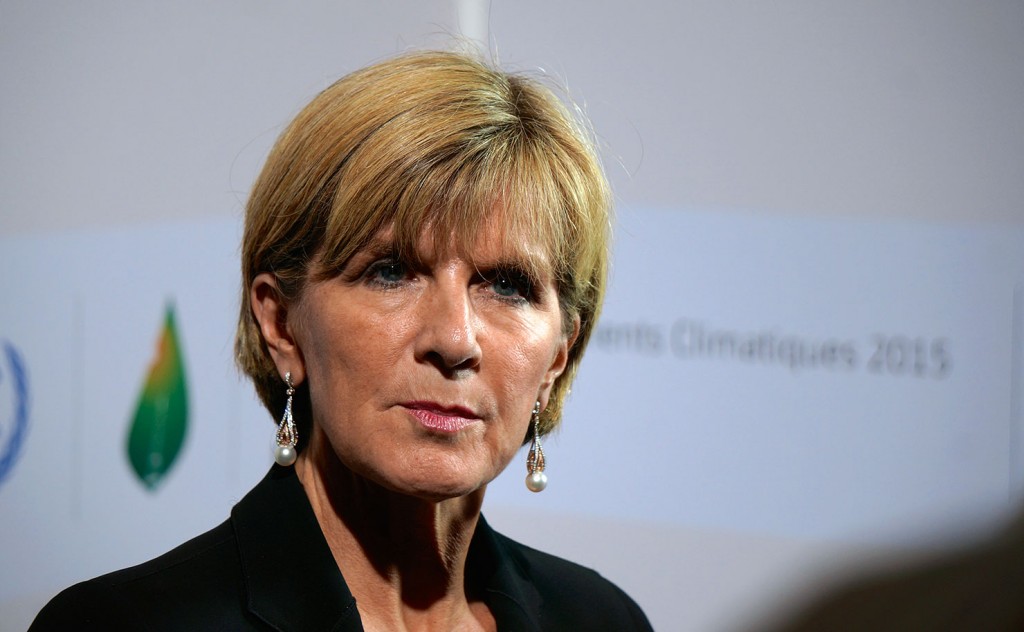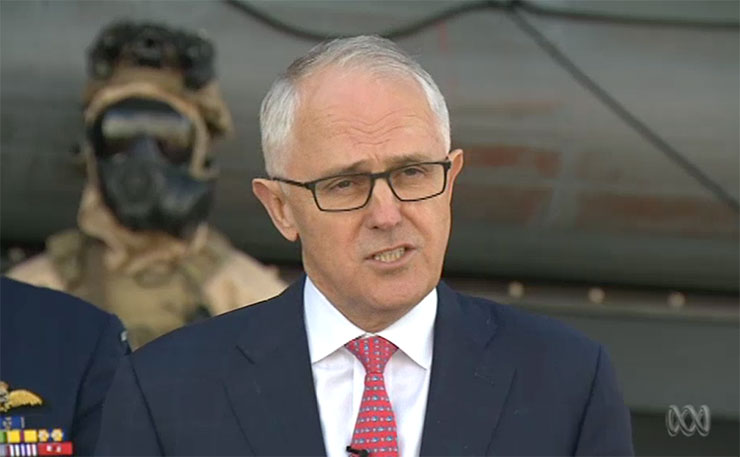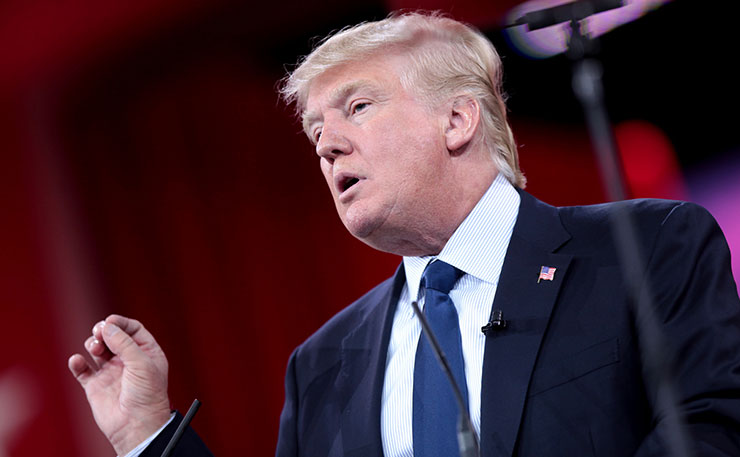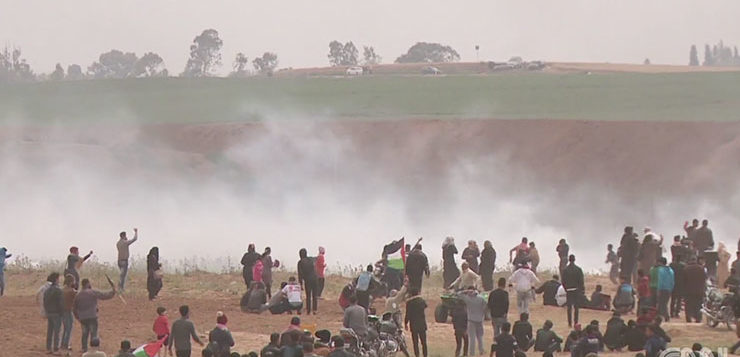After Gaza, it’s not enough to simply denounce politicians’ moral bankruptcy, writes Nick Riemer.
Israel’s killing of at least 60 Palestinians at the Gaza boundary fence on Monday defied the 24-hour news cycle and stayed firmly in the headlines most of the week. For good reason: on its own, Monday’s death toll constituted over half of the one hundred and eleven people gunned down since the March of Return protests began on March 30.
Altogether, a staggering 12,733 people have been injured in the protests, including 3,569 victims of live gunfire. In striking evidence of the levels of falsification which Israel’s public relations attain, an Israeli diplomat claimed that every single protester killed on Monday was a ‘terrorist’. Far from all being terrorists, these ‘protesters’ weren’t even all protesting: one was an eight month-old baby, others were children. In any case, as this footage shows, the IDF can shoot Palestinians just for standing around, or for running away from the border fence, not for approaching it.
The numbers we hear about Gaza are stunning, but they can also risk anaesthetising us to the horror of the pathological, calculated blood-bath we have been witnessing.
Graves have been dug for journalists, children and an amputee in a wheelchair. Israel’s actions over the last six weeks have made it a nation-sized version of a US high-school shooter – but one who, after the first massacre, is allowed to keep on coming back, again and again, to exactly the same classrooms, to take aim again and again, always re-armed with deadly new weapons.
Pathological, too, has been official reaction in this country. Until Monday’s events, the Australian Government had offered no commentary on the weeks-long killing-spree. Last week, the Greens’ Janet Rice had advocated, to a largely empty Senate, that Australia recognise the state of Palestine, impose an arms-trade embargo on Israel until the occupation and settlements stop, and called on Israel not to kill protesters.
From the government and opposition, nothing — no expressions of solidarity with Palestinians or Palestinian Australians, not even any calls for restraint, and obviously nothing remotely near a declaration that ‘Je suis Gaza’.
No indication that, as far as the government was concerned, events on the Gaza boundary should be treated as anything but business as usual.
When the government did finally find it necessary to speak, it was to affirm, via Julie Bishop, that ‘Israel has legitimate security concerns and needs to protect its population’. Bishop urged Palestinian protesters ‘to refrain from violence and attempting to enter into Israeli territory’, and called on Israel ‘to be proportionate in its response and refrain from excessive use of force’.
This merits reflection. A modern army, with its armour-plated soldiers, drones, and ability to rain laser-guided missiles down on targets at almost no notice, shoots over 1,300 protesters, without a single casualty on its side, and Bishop urges the protesters to refrain from violence. Sixty people are killed, and she presents the protesters as a threat.

Bishop also called on the army not to use ‘excessive’ force. She must think, then, that some force is acceptable. At what point do Palestinian deaths start counting as ‘excessive’? Not once in her media release on Monday night (dated Tuesday) did Bishop fault Israel for the deaths up to that point: all she did was urge Israel to show restraint in the future.
She could, like the NZ PM Jacinta Ardern, have criticized Israel for perpetrating a “devastating, one-sided, loss of life”; she could, like Ardern, have condemned the violence. Like many countries, including New Zealand, she could have called in the Israeli ambassador. But she didn’t.
For all we can conclude, Bishop is relaxed and comfortable with the death toll so far, just like she’s relaxed and comfortable with the deaths and misery her government’s policies inflict on Aboriginal people and refugees.
Bishop is only the Foreign Minister. To reach peak propaganda, you had to go to Prime Ministerial level. Faced with the deaths of protesters, Turnbull was widely quoted, including in Israel, reproducing the cynical line promoted by Israel and the US: that the deaths were Hamas’ fault. Hamas were displaying ‘confrontational’ conduct and ‘seeking to provoke the IDF’. A crowd assembling, unarmed, near the boundary fence is, for Turnbull, a ‘provocation’.
The fact that a handful of protesters – eight – carried weapons and tried to breach the fence has been advanced, including by Tzvi Fleischer in Fairfax, as somehow justifying their summary execution by the IDF. Yet on the streets of Israel itself, ‘guns are as ubiquitous … as falafel stands’, but no Israelis are slain by the IDF for carrying a weapon or wirecutters.
For Gazans, Turnbull clearly thinks other standards should apply. No doubt that plays well in a sector of his electorate, with its high proportion of Zionist voters. Outside it, in the real world, one marvels at how this nonsense is even utterable. When Hamas actually used their weapons mid-week – by firing at military positions in Sderot without causing casualties – Israel responded by airstrikes.

It goes without saying that, as the Greens pointed out, the ALP was no better than the Liberals: true to its longstanding record on refugees, indigenous justice, industrial relations and any number of other issues, it is also, despite Bob Carr’s efforts, still deeply backward on Palestine. Shorten told the media that ‘both sides should de-escalate the situation’, setting up a moral equivalence between Israelis and Palestinians that implied that Israelis, who have suffered zero casualties since March 30, were victims too.
Wong declared that occupied East Jerusalem is actually ‘contested’, thereby suggesting that she alone is privy to a secret unknown even to the UN, which settled any contestation long ago by unambiguously declaring East Jerusalem Palestinian territory.
The best statement, as usual, came from the Greens’ Lee Rhiannon, who said that ‘Palestinians have the right of return. Palestinians have the right to justice. Palestinians have the right to expect that basic international standards of humanity and decency should be applied to them.’
No ritual insistence that Israel and Australia are ‘best friends’, like her fellow Greens Janet Rice had told the Senate in her otherwise excellent speech last week. Forget about ‘best friends’: Rice hadn’t even explained why Australia needs to be any ‘friend’ of Netanyahu’s Israel at all. The real explanation – solidarity among settler-colonial states – is not one any progressive should endorse.
Earlier in the week for NM, I wrote about the way that Zionists like to emphasise the ‘complexity’ of the Palestine question, and showcase their pessimism about the attainability of peace. Whether their proponents realize it or not, these gambits’ essential role is as countermeasures designed to lower pressure on Israel.
Stressing how complex and depressing the situation is works to suppress people’s confidence in the possibility of meaningful solidarity with Palestine, for instance through the Israel boycott (BDS) campaign.
Another such countermeasure is the idea that moral bankruptcy — of Netanyahu, of Hamas, of Trump, of Turnbull, of liberals — is ultimately to blame for the tragedy in Palestine-Israel. Calling political leaders or systems immoral is a standard and natural part of our everyday vocabulary of political judgement. Morality talk is a way of registering politicians’ responsibility for their decisions, and connects to people’s sense that politics is ultimately about right and wrong. We call politicians immoral because their actions matter, and we want them to be accountable for them.
On Israel as on many other issues, there’s no shortage of moral talk. Since the Gaza Return March protests started, Twitter and Facebook have had any number of denunciations of the ‘immorality’ of Israeli and Western politicians.
What Israel is doing in Gaza is not complicated. It is immoral and inhuman. America is responsible for financing and arming Israel and for provoking these atrocities with Trump’s embassy move.
If you are Jewish and want to stand on the side of righteousness, follow @IfNotNowOrg.
— David Klion 🔥 (@DavidKlion) May 14, 2018
In Forbes on Nakba Day, John Zogby called the Trump administration’s actions ‘immoral’. A Haaretz headline earlier this week condemned ‘America’s Immoral Support for Israel’s Alt-right Government’. The discourse of morality is a permanent, unavoidable feature of our talk about politics. I’ve used it myself.
Politicians’ moral blindness on Israel is real. But there’s a danger in stressing it too much. Concentrating on the moral dimension of politics also means personalizing it, and thereby obscuring the systemic, structural drivers of injustice. This suits the right perfectly: they rebut charges that they’re immoral with claims that their opponents are. Netanyahu and the IDF are, themselves, highly invested in the discourse of moralism: the IDF is the most moral army in the world, Israel a humane and ‘decent’ society.
Israel and its supporters’ actions are immoral, but the analysis should not stop there. The violence, colonialism and racism that allow Israel to subjugate Palestine with impunity need to be discussed as the result of systemic political structures, not personal moral qualities. The discourse of moralism leads too easily to a response that remains confined within the parameters of personal moral outrage. Writing in The Intercept after the early massacres, Mehdi Hasan illustrated the direction moral talk so often leads, commenting that the ‘moral blindness that so many liberals and progressives in the United States have for the Palestinians has never ceased to amaze — or disgust — me’.
It’s impossible not to share Hasan’s disgust at liberal hypocrisy, but a political response has to go beyond the amazement or disgust that moral blindness provokes.
Progressives shouldn’t ultimately be too interested in disgust or in distributing moral brownie points among political actors. A dominant framing of political choices in moral terms suggests that the road to policy change will come from a personal moral epiphany in politicians, a change of heart.
If the central fact about the global politics of Palestine is Western politicians’ moral bankruptcy, then that suggests that the priority for Palestine supporters is to win an argument with MPs about what is right and wrong – shepherd each leader by the hand down their road to Damascus for them to experience a blinding moral conversion.
That way of thinking simply writes out the public as an agent of change, and sees progress as the result of the powerful moral appeals of astute political insiders.

Good luck with making a moral appeal to Trump. It’s obvious that Trump is immune from appeals of that kind. But so, ultimately, are most other politicians. Support for Israel strongly unites the Anglo political establishment: the intense opposition that Corbyn has encountered in the UK for his overt pro-Palestinianism is all the evidence of that we need.
In the echo-chambers of opportunism and ruling-class interest that are Westminster, Washington or — ridiculous as it is to include it in the same breath — Canberra, politics is about pressure, not about argument or moral appeals.
If Palestine supporters want to make a moral argument, let’s by all means do so, but not by mainly appealing to the better conscience of career politicians whose unwillingness or inability to listen couldn’t be clearer. Despite their power, they’re at best a side-show when it comes to effecting serious change.
For most politicians, there is little reason to think that the hoped for moral epiphany will ever happen; if it does, there is little reason to think that it could be enough to force them to act. Politicians may share your moral outrage, but their hands are always, they tell us, tied. The people with the greatest power to influence official politics are usually the least willing to do so.
That’s why Palestine supporters should devote their greatest efforts to making an open, public appeal for grassroots solidarity with Palestine through BDS.
BDS is a strategic threat to Israeli apartheid. Advocating it makes a powerful, moral call on ordinary people’s sense of right and wrong.
That’s a thousand removes from the impotent entreaties to the parliamentarians who have demonstrated — on climate, on racism, on redistribution, on refugees, on arms control — that political interest trumps morality, nine times out of ten.
Donate To New Matilda
New Matilda is a small, independent media outlet. We survive through reader contributions, and never losing a lawsuit. If you got something from this article, giving something back helps us to continue speaking truth to power. Every little bit counts.





